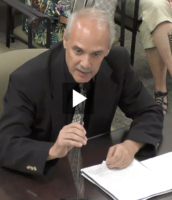 A hearing was held last week in Pennsylvania on House Bill 955, which would provide local governments in the state with the option to move their notices from paid-circulation newspapers to government websites or government-printed publications, newspaper websites, free-circulation newspapers, legal newspapers or shoppers.
A hearing was held last week in Pennsylvania on House Bill 955, which would provide local governments in the state with the option to move their notices from paid-circulation newspapers to government websites or government-printed publications, newspaper websites, free-circulation newspapers, legal newspapers or shoppers.
The hearing was notable for the breadth of issues it addressed and the emphasis the Pennsylvania NewsMedia Association placed on the economic impact the bill would have on local newspapers in the state if it passes.
Bill supporters presented their case in a manner that belied the significance of its potential impact on a vital source of government transparency, while PNA made a strong case for the value of local newspapers as trusted sources of information in the communities they serve.
[Watch the hearing on PA HB 955]
HB 955 sponsor Rep. Jason Ortitay (R-Washington/Allegheny) began the hearing by presenting his bill as a common-sense way to update the state’s public notice statute while saving taxpayer dollars.
Government lobbyists backing Rep. Ortitay’s measure testified in its support, focusing primarily on the “flexibility” it would provide to local governments. However, they weren’t prepared to respond to concerns raised by members of the committee, including the lack of broadband access in rural areas of the state and the chaos that would ensue if government agencies each selected a different venue to publish their notices.
For example, they couldn’t answer a question about the percentage of municipalities that have a website.
“That’s important for us to know,” Committee Chairman Jerry Knowles (R-Schuylkill) said. “The internet access is fine but it really doesn’t do much if (local government units) don’t have a website.”
Testifying in opposition to HB 955, Robert Rolley (pictured above), publisher of The Williamsport Sun-Gazette and The (Lock Haven) Express, emphasized his paper’s broad digital reach on multiple channels and gave a master class in how to treat public notice clients like business partners. The comparison to guys who don’t know how many websites they have was striking.
Rolley stressed the “return on investment” his local-government customers get when they purchase public notice advertisements from his papers. As an example, he cited the important news coverage one of the papers devoted to a special meeting about school closures it learned about from a notice it published.
He also talked about how his papers “review, edit and place” the notices they receive. “In fact, we have saved local governments and school boards from publishing incorrect notices that had wrong dates or wrong information,” he said. “I can’t tell you how many times that’s happened.”
Having described the value his papers provide, Rolley wasn’t shy talking about the importance of the income they derive from publishing notices. “We count on that revenue,” he said, connecting its potential loss to less local journalism and more local corruption.
“Taking public notice out of newspapers would be devastating to my (newspapers’) business and those across the state,” said Rolley.
Pennsylvania NewsMedia Association President Brad Simpson leaned into the revenue issue and linked it to free-market concerns. “With lost revenue from public notices, our members would be forced to cut jobs or, worse, close their doors,” he said. “Moreover, taking jobs away from private industry in favor of a government takeover is simply not consistent with the free market.”
The hearing was also notable for the wide range of important but often overlooked issues raised by committee members during the Q&A portion of the hearing, including the need for a publisher independent of the government (“a second set of eyes … looking over their shoulder and making sure it’s done right”), the importance of hard-copy archival of “historical documents”, and the vulnerability and instability of local government websites.
Democratic chairman Robert Freeman (D-Northampton) displayed an especially nuanced view of the issue throughout the hearing, frequently giving voice to the importance of newspaper notice.
